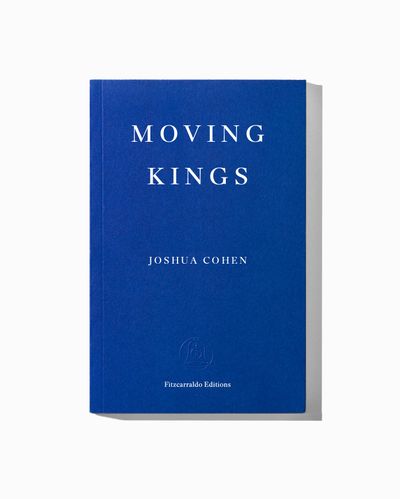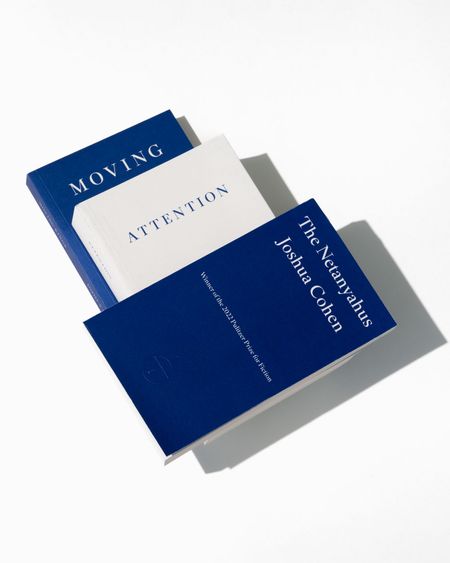One of the boldest voices of his generation, Joshua Cohen returns with Moving Kings, a propulsive, incendiary novel that interweaves, in profoundly intimate terms, the housing crisis in America’s poor black and Hispanic neighborhoods with the world’s oldest conflict, in the Middle East.
The year is 2015, and twenty-one-year-olds Yoav and Uri, veterans of the last Gaza War, have just completed their compulsory military service in the Israel Defense Forces. In keeping with national tradition, they take a year off for rest, recovery, and travel. They come to New York City and begin working for Yoav’s distant cousin David King – a proud American patriot, Republican, and Jew, and the recently divorced proprietor of King’s Moving Inc., a heavyweight in the Tri-State area’s moving and storage industries. What starts off as a profitable if eerily familiar job – an “Occupation” – quickly turns violent when they encounter one homeowner seeking revenge.
Driven by Cohen’s characteristic intelligence, boundless energy, psychological tension, and humor, Moving Kings is a powerful and provocative novel about faith, race, class, and what it means to have a home.

Moving Kings
Published 20 July 2017, French paperback with flaps, 240 pages
Moving Kings
DAVID
(In Distraint)
Ye shall know them by their vehicles: those blue trucks that’re always cutting you off on your way to the airport, sides emblazoned with grimy white crowns, dinged bumpers stickered GOT A PROBLEM WITH MY DRIVING? CALL 1-800-212-KING!
Ye shall know them by their ads: on basic cable and drivetime radio, those billboards that’re always blocking the signs and making you miss the airport turn, with their offers of free estimates over the phone and 100% money back guarantees.
Or maybe, like more than 180,000 other satisfied customers served in all five of the boroughs and three neighboring states since 1948, you know them as the Courtly Couriers®, or the Royal Treatment Pros®, or the Removalists with the Regal Touch™—whom you’ve let into your home, to move your most precious possessions to your new home, or else to one of their six 24-hour, security-monitored, climate-controlled storage facilities conveniently located throughout the New York Metropolitan Area.
Or maybe, whatever you know is wrong, because you’ve just been reading their online reviews.
King’s Moving (David King, President, Spokesman, Container of Crises, Stresses, & the Distrained) was a licensed, bonded, limited-liability insured large small business that specialized in—one guess—moving … ’n’ storage … ’n’ parking … ’n’ towing … ’n’ salvage … ’n’ scrap, activities that demanded the bloodsweat of plus/minus 40 fulltime and 60 parttime employees, 50 vehicles, three lots, five garages, six 24-hour, security-monitored, climate-controlled storage facilities conveniently located throughout the New York Metropolitan Area—not to mention a headquarters in Jersey City, hard by the piers.
Above all, King’s Moving was a family business. Family owned, family operated. Family, family, family… Take that into account, Your Honor…
It was summer, toward the weekend of a holiday week—Moving Day (last day of the month, first day of the month), followed by Independence Day—and David King was out in the Hamptons at a birthday party for America, to which he’d been invited as a member of the Empire Club, which had required attendees to donate upwards of $4K for the privilege of drinking diluted booze and eating oversauced BBQ under the auspices of the New York State Republican Committee.
Inviting him to a party and then making him pay: that was class. That was how billionaires stayed billionaires.
And David, who’d resented even the toll to the Long Island Expressway, couldn’t help but wonder whether he’d met $4K worth of people yet—he couldn’t help valuating everything: the people, the property, the Victorianized manse shadowing the pool. His phone was vibrating again in his pocket.
He canceled the call—he was working.
He was working by attending a party at which he didn’t know anyone, or knew only that he recognized: names, faces, profiles.
It was work having to restrain himself from mentioning mergers he’d only read about, acquisitions that weren’t his, a celebrity stranger’s divorce/custody negotiations still ongoing—having to endure discussions of clean ocean and beach replenishment initiatives, when all he wanted to know was: daughter or wife? when all he wanted to know was: does anyone know where our host is? It was work pretending he blended, he mixed, pretending he wasn’t sweating and had a second residence of his own and was a Hamptons vet and agreeing yes hasn’t the Meadow Lane heliport gotten so crowded lately? and yes isn’t Ray from Elite Landscapers just the best?
Because the fact remained that David had never been this far out on the Island before and not only couldn’t he tell you which of the Hamptons he was in, he couldn’t even tell you the number of Hamptons, or the differences between the Hamptons, or what made a Hampton a Hampton, singular, to begin with.
“Hope we’re not keeping you?” a lady said.
David said, “Come again?”
“You keep checking your phone.”
“I’ve got foreign business, never stops. It’s already July 5th somewhere.”
And he excused himself from that bezant of lawn and its assembly of skinny flagpole women flying dresses in red, white, and blue.
Ruth, his office manager, had been calling without leaving messages. Now she was gibberish txting: sorry sorry bill sick have take bill jr bball practice.
And then: anyway not finding passcard.
David made his way among tents, buffet tables of chafing and carving and bars—the trick was to keep on the move.
Kids—put David around kids and he’d fantasize about having them and only then would he recall that he had a daughter, who was an adult now—the kids were having their faces smeared native with warpaint. They bounced around on a giant inflatable galleon, parried and thrust with balloon swords.
A breeze blew in with the dung of elephant rides.
He moved among servers who made $8.75 an hour and so who made about 14 cents, 14.5833 cents, he did the figures in his head, for each minute it took them to carve him primerib or fix him a scotch or direct him and his menthols to a smoking area.
Conversations collected, as they were conducted, in circles. About stocks, about realestate, stocks. About renovations and how draining it was to open a house for the season. Apparently, to have two houses meant always neglecting one of them, at least. About alarm systems, sprinkler systems, sump pumps, white vs. black mold. About politics.
David’s politics were aspirational, inferior: he was in favor of contacts, contracts, the right to not diet, and the right to jump lines at dessert stations.
David King was a man who if a longtime employee flaked on a commitment on short notice because her exhusband was too ill to take their son to a baseball practice that wasn’t even hardball but actually softball, or if his primerib came closer to medium than to the already spineless concession that was medium rare, or if his Dewar’s 18 turned out to be Dewar’s 15 or 12 or God forbid came with an icecube or even just an extra splash of water, or if the line for the dessert station was moving so indecisively slowly that his icecream would melt before he got to the toppings he liked—it wasn’t his fault that he was so decisive about his toppings—he’d scream, he’d have a conniption, and yet once he’d fudged his sundae with a cherry atop he had all the attention, all the guilty sated childlike attention, for being lectured by an Ivy League B student on the new model Gulfstreams (though David didn’t have his own plane), the best sailing routes (though David didn’t have his own boat), the best steeplechase courses (David didn’t even have a pony), how New York State was the most regulated state in the union, the state with the highest taxes, the state with the highest energy costs, the highest fuel costs, the highest insurance premiums, and a convoluted body of tort law that made even the Nazi justice system seem unbiased and lenient, and how so and so was really the only candidate to bet on, so and so the only candidate who had real plans both for the Middle East and for midsized American businesses (our composited Ivy League B student apparently knew his audience)—the only candidate who was legitimately “Pro-Growth,” and that was the line, or the jargon, that struck him, and brought to mind the image of a small modest neat building, like some fourfloor prewar walkup in the Village, which with every vote for a Republican grew taller by the floor, until it became this big shiny tower that clockhanded all of Manhattan, and then, by association, his mind flashed below his belt, which was on its last notch, and below his gut, which hung like a panting tongue over it, to his bloodless dick, which—as if his heart had betrayed the party platform, “Pro-Growth”—dangled limp and useless.
(…)
‘A Jewish Sopranos … burly with particularities and vibrant with voice … utterly engrossing, full of passionate sympathy … This is a book of brilliant sentences, brilliant paragraphs, brilliant chapters … There’s not a page without some vital charge – a flash of metaphor, an idiomatic originality, a bastard neologism born of nothing … Cohen is an extraordinary prose stylist, surely one of the most prodigious in American fiction today … his sentences are all-season journeyers, able to do everything everywhere at once … A crystalline novelist with a journalistic openness to the world.’
— James Wood, New Yorker
‘Joshua Cohen’s Moving Kings is a lit fuse, a force let loose, a creeping flame heading for demolition, and Cohen himself is a fierce polyknower in command of the workings of the moving parts of much of the human predicament. A master of argot and wit, he writes the language of men in a staccato yet keening idiom of his own invention. And though it is set in a grungy New York, call this the first Israeli combat novel ever dared by an American writer.’
— Cynthia Ozick, author of Foreign Bodies
‘Joshua Cohen is a blacksmith who heats, hammers and molds the language to sharpest, most precise points. Not for the sake of craft, but to tell a troubled story about troubled life in the twenty-first century. This is a dazzling and poignant book.’
— Rachel Kushner, author of The Flamethrowers
‘If there is a job of the epoch, it might be the Removal Specialist. Since 2008, and the sub-prime mortgage fiasco, removal firms have been doing well. David, the star of Joshua Cohen’s new novel, owns such a firm, and he’s currently being asset-stripped by his wife. Meanwhile, Tel Aviv might not be the best place to seek solvency. Funny, smart, and perfectly addictive, Moving Kings is a novel of wonderful scope. It shows Cohen at the top of his powers and is bound to bring him many new readers, hot for a fresh understanding of America.’
— Andrew O’Hagan, author of The Illuminations
‘Joshua Cohen has become one of America’s top young novelists … His new novel, Moving Kings, is the tale of a modern-day King David … Cohen’s writing is filled with sharp turns of phrase and elegant rhythms … The denouement is as vengeful as any Old Testament plot twist.’
— Sarah Begley, Time
‘[Cohen] explores the differences between an American Jew and his newly arrived Israeli cousins with intelligence and sympathy … This is an astute and often penetrating look at a divided world, lightened with sympathy for all its flawed protagonists.’
— Alexander Larman, the Observer
‘At 240 pages, Moving Kings is considerably shorter than Cohen’s previous two novels – the dazzling, tech industry-satirising Book of Numbers (2015), and his 2010 800-page epic Witz – but it’s sharper and feels important and timely for the way it dramatises life at the harsh end of western societies where housing is regarded as a commodity rather than a right. This is a deeply political novel that helps us to imagine a world where the real kings and queens will not be the property racketeers, but instead those who attain a freedom that has nothing to do with what they own.’
— Max Liu, Financial Times
‘[A] brilliant American novelist … [Moving Kings] is subtle and intelligent and compelling – and quite brilliantly composed, every page wriggling with little riffs and sallies.’
— Ian Sansom, the Guardian
‘Dense, insightful, and funny … [Moving Kings is] at its best when tied up in the on-running thoughts of its main characters, spiked with deliciously barbed turns of phrase, blending intensity and humour in equal parts.’
— Ian Maleney, Irish Times
‘[A] gritty, thought-provoking and enthralling read.’
— Buzz Magazine
‘This lively story of the fraught ties that bind an American, Republican Jew and his Israeli family makes another strong case for Cohen’s admission into the ranks of the Great American Novelists.’
— Esquire
‘[A] brilliant book … Cohen has a brain-on-fire intellect and a Balzac-grade enthusiasm for understanding varieties of experience.’
— Mark Athitakis, Los Angeles Times
‘Moving Kings is a swift, darkly funny, surprising – and brilliant – novel … [Cohen] manages to bring together a treatment of 50 years of the Palestinian occupation with a story about American gentrification.’
— Gideon Lewis-Kraus, Vice
‘[An] engaging book that alternates between New York City and Israel to tell of characters looking for, or jealously guarding, a sense of home and belonging…. Cohen writes evocatively about the Israeli terrain.’
— Rebecca Foster, Nudge
‘Though written with all the swagger, dazzle, and gonzo humor we’ve come to expect from Cohen, Moving Kings is a focused, efficient novel about the idea of home and its absence, about what it means to be unhomed and what it might feel like to unhome others in turn…. On every page there’s a description or observation with a clarity and freshness that shocks you with the thrill of recognition.’
— Jon Day, Bookforum
‘Snappy, heartfelt, vivid, and often note-perfect in its depiction of displacement, aging, and the compromises of being part of an occupying force.’
— Karan Mahajan
‘Moving Kings is a svelte comic triumph that concentrates [Cohen’s] genius. Here, in a story inflected by verbal dexterity but not overwhelmed by it, Cohen explores themes of power and Jewish identity with the same insight that has justly attracted praise from some of the country’s most sophisticated writers.’
— Ron Charles, Washington Post
‘Trenchant social critique … A kaleidoscopic cross-section of New York’s underclass … Cohen gets to the heart of his troubled characters, sensitively portraying damaged psyches from all levels of Israeli and American society.’
— Library Journal (starred review)
‘In his audacious new novel, [Joshua] Cohen confronts the bewildering nature of displacement…. Lovingly personal character studies, an outrageous sense of humor, and a voice both stylish and astute.’
— Booklist
‘Wild brilliance … An ambitious and thought-provoking read.’
— Publishers Weekly
‘A wide-ranging novel that touches on political, religious, and social issues … [Cohen] is funny and caustic and has a marvelous snap in his dialogue.’
— Kirkus Reviews (starred review)
—
An interview with Joshua Cohen in the Oxonian Review
—
Joshua Cohen was born in 1980 in Atlantic City. His books include the novels Moving Kings, Book of Numbers, Witz, A Heaven of Others, and Cadenza for the Schneidermann Violin Concerto; the short fiction collection Four New Messages, and the non-fiction collection Attention: Dispatches from a Land of Distraction. Called ‘a major American writer’ by the New York Times, ‘maybe America’s greatest living writer’ by the Washington Post, and ‘an extraordinary prose stylist, surely one of the most prodigious at work in American fiction today’ by the New Yorker, Cohen was awarded Israel’s 2013 Matanel Prize for Jewish Writers, and in 2017 was named one of Granta’s Best Young American Novelists. In 2022, he was awarded the Pulitzer Prize for Fiction for The Netanyahus. He lives in New York City.





